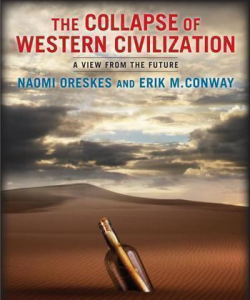Book Discussion: The Collapse of Western Civilization

The year is 2393, and the world is almost unrecognizable. Clear warnings of climate catastrophe went ignored for decades, leading to soaring temperatures, rising sea levels, widespread drought and -- finally -- the disaster now known as the Great Collapse of 2093, when the disintegration of the West Antarctica Ice Sheet led to mass migration and a complete reshuffling of the global order. Writing from the Second People's Republic of China on the 300th anniversary of the Great Collapse, a senior scholar presents a gripping and deeply disturbing account of how the children of the Enlightenment -- the political and economic elites of the so-called advanced industrial societies -- failed to act, and so brought about the collapse of Western civilization.EJ
In The Collapse of Western Civilization: A View From the Future, a fictional history based on factual data, co-authors Naomi Oreskes and Erik M. Conway describe the current era as the “Period of the Penumbra,” or “the shadow of anti-intellectualism that fell over the once-Enlightened techno-scientific nations of the Western world…preventing them from acting on scientific knowledge available at the time.” Conway will visit CNS to discuss the ways in which this thesis intersects with knowledge produced in the CNS—in areas such as globalization, risk perception, and the history of science and technology.










